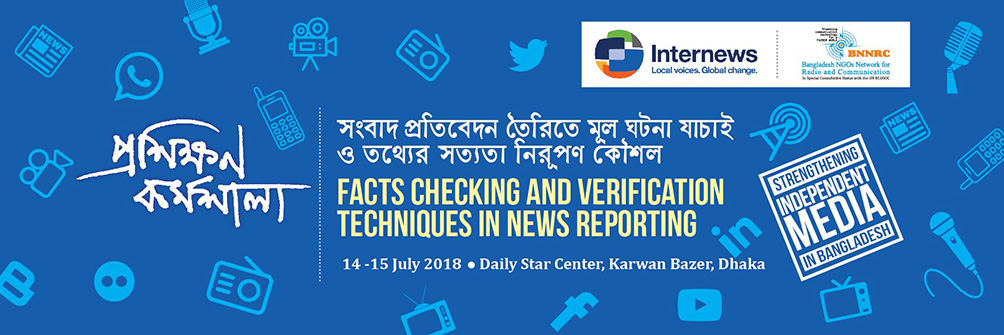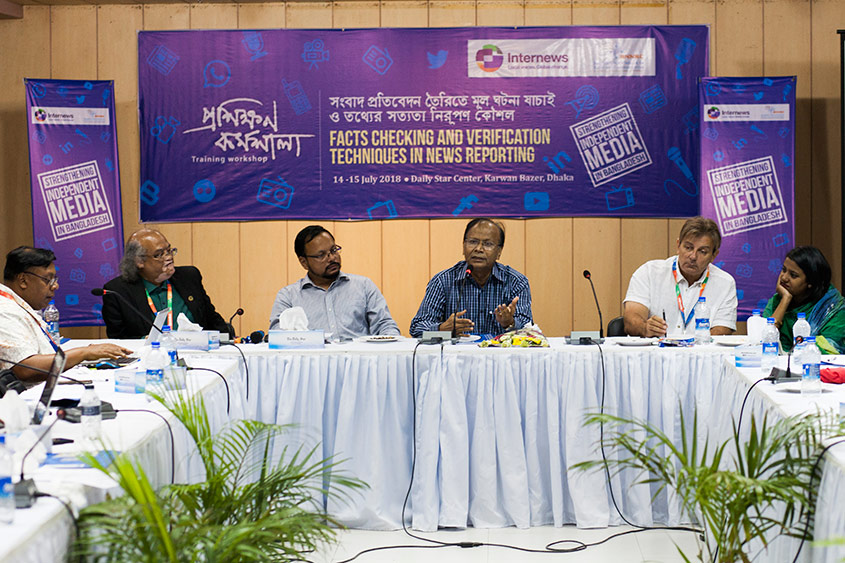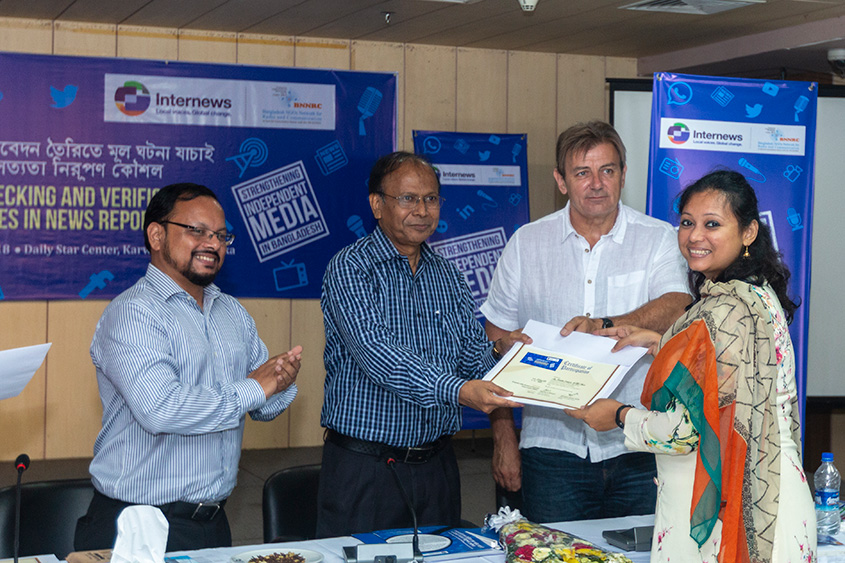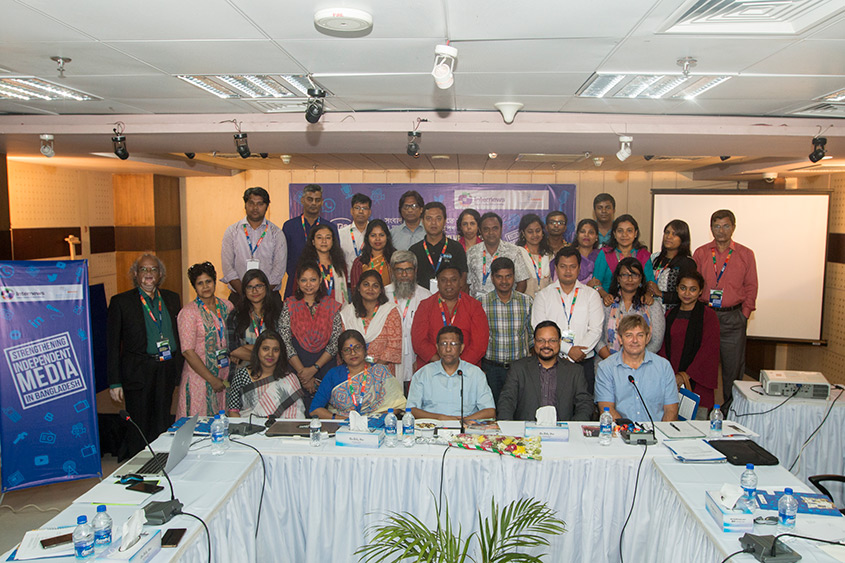
14-15 July 2018, Dhaka, Bangladesh
Vanue: Daily Star Center, Dhaka, Bangladesh
Facilitator: Chris Stephen, journalist, The Guardian.
List of Workshop Participant
Program Schedule
| DAY ONE | 10 July 2018 |
|---|---|
| 10:00-10:15am | Registration |
| 10:15-11:00 am | Welcome & Introductions Discussing Newsroom Roles Performed What do you want to achieve from this workshop (listening to the trainees’ learning expectations or objectives)? Who is your audience Understanding your audience – discussion on readers/listeners feedback? What does your audience expect from your coverage (dialogue with readers/listeners on social media, maybe call-ins or emails)? Outcome: Determining trainees’ reporting experience and their audience; clarifying workshop objectives; coming back to trainees’ expectations at end of training. |
| 11:00 am -12:00 noon | The Role of the Reporter is based on Trust Gaining audience/readership trust. ‘Better right than first.’ Principle values of good reporting and how to achieve them. What to believe? sourcing the news, putting value on sources and fact checking: BBC ‘Reality Check’ and similar initiatives Seeing both sides: how to get there (Northern Ireland example) The essential position of the reporter/journalist and how it works in practice |
| 12:00-12:30 pm | True or false? – The Role of the Journalist in Conflict What is the root cause of conflict (how do we Identify and report on conflict already)? What is the CSJ way? (How to report responsibly and use facts not conjecture) Lessons from Libya and Syria Propaganda: truth is the first casualty in war Exercise: Sourcing the news: putting values on sources and attribution. Outcome: Trainees learn about reporting objectively and understand the different types of conflict; Case Study 1 |
| 12:30-1:00pm | Objectivity in practice. Issues of bias or belonging for journalists – examples from Syria, Iraq Dealing with one’s own prejudice, and examining how principles of good journalism can be applied How to avoid using stereotypes (on race, ethnicity, gender for e.g.) Understanding neutral language Outcome: Understanding the necessity to look at motivating factors behind conflict; Knowing who the actors are and the role they can play in resolving it |
| 1:00-1:30 pm | NETWORKING BREAK |
| 1:30-2.30 pm | Fake News: what it means and how to overcome it Different definitions What distinguishes journalism from blogging? ‘Disinformasiya’ (as ‘fake news’ is known in Russia!) Does it happen here? What kind of stories can improve host and refugee community relations? (Creating a sense of community) Building peace, improving refugee-host community relations, through good news reporting Outcome: Understanding of accurate news versus disinformation or lazy reporting in the Rohingya context |
| 2:30-3:00 pm | Summarizing the First Day Overnight Assignment: Looking for bias or questionable ‘facts’ in sample news reports |
| DAY TWO | 11 July 2018 |
|---|---|
| 10:00-10:45 am | Analyze news reports from Overnight Assignment Participants discuss selected news reports from local and international media Outcome: Participants have a better understanding of the common mistakes in journalism – avoiding bias, stigma and dehumanization |
| 10:45-11:45 am | Interview techniques: Participants interview and present each other to group How to ask better questions in an interview (open ended vs close ended; avoid double barreled questions, listening attentively and asking good follow up questions) How to approach an interview subject sensitively (not being aggressive, asking questions nicely, not being too pushy) Outcome: Assessing trainee interview techniques and challenges |
| 11:45 am-1.00 pm | Fighting fake news: Verification tools for journalists TinEye, YouTube Data Viewer, Exif Viewer, Pipl.com, Storyful To share or not to share on Facebook |
| 1:00-1:45 pm | NETWORKING BREAK |
| 1:30-2:00 pm | How to be a Digital Detective: Monitoring social media for misinformation and hate speech |
| 2:00-3:00 pm | Pulling it all together: Q&A What lessons have you learned about good journalism, being balanced impartial, overcoming biases and using neutral language? How will this training improve your future reporting/journalism? Outcome: Do you have any new ideas or techniques, or story ideas, to take back and discuss with your editors? |
| 3:00-3:30 pm | Closing: Remarks by Chief Guest, Special Guest, Distribution of Certificates |
Picture of Workshop:

Mohammad Shah Alamgir, Director General of Press Institute of Bangladesh (PIB) speaks at the closing of the workshop as the guest of honour. Also seen are Chris Stefan, course coordinator of the workshop (to his left), Zain Al Mahmood, Country Director of Internews (to his immediate right) and AHM Bazlur Rahman, Chief Executive Officer of BNNRC.

Mohammad Shah Alamgir, Director General of Press Institute of Bangladesh (PIB) handing over certificate to one of the participants of the workshop. Also seen are Zain Al Mahmood, Country Director of Internews (to his right) and Chris Stefan (to his left).

The participants of the workshop pose for a group photo with the Chief Guest Mosharaf Hossain, (sitting in the centre) Additional Secretary (Broadcast) of Ministry of Information.
